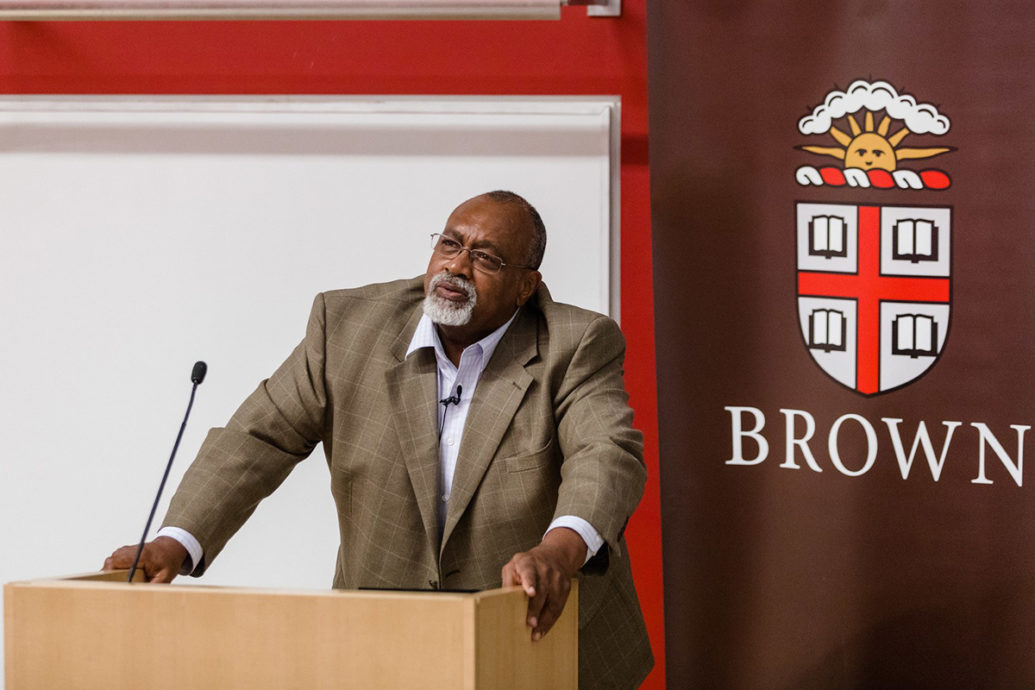Bosch shows there is some measure of justice as well as love and forgiveness in L.A.
Social Control and Human Dignity
Barry Latzer’s recent piece addresses a fact that has to be part of any meaningful conversation about race and policing: young black men commit a disproportionate amount of the violent crime that persists in this country. That fact surely helps explain why police disproportionately apply force against black men and interact with black men. It also helps explain why our prisons disproportionately house black men. That’s a critical point, but I don’t think we can stop there. As Glenn Loury, the Merton P. Stoltz Professor of the Social Sciences in Brown University’s Economics Department, has argued in a series of lectures on mass incarceration, that approach is rather “thin.” It might suggest a viewpoint that denies social responsibility for the method of social control we have adopted, resting complacent with the fact that criminals are guilty of the crimes they committed and deserve their time in the clink. That may be true, but it only goes so far. We should also consider the broader context of how we as a society have chosen to deal, or perhaps not deal, with the persistence of crime in poor black communities.
Loury’s recent writings, interviews, and conversations at his vlog with John McWhorter help make space for serious people of all races interested in understanding and discussing problems of race, police, and crime in a holistic way that does not force them to deny obvious facts. Loury has made the point, consonant with Latzer’s argument, that violent crime is a much greater threat to black lives than police violence, by the numbers. More broadly, Loury offers a deeply humane analysis of our policy of social control and response to violent crime since the early 1970s. He argues that our method of social control has damaging effects on many of our communities and the people whose lives the criminal justice system touches, effects disparately borne in poor black communities. These effects are such to make the method of social control we have adopted a systemic injustice that demands the attention of policymakers and leaders around the country. Loury’s analysis is distinguished from others in that he insists on applying moral categories and acknowledging personal agency. He sees the problem in its multidimensional entirety: not simply as a crime or mass incarceration problem, but a problem of social control and ultimately human development. He calls us to a greater sense of social responsibility than our policy since the 1970s has exhibited. We should heed his message.
Loury insists on nuance. He insists on the proper application of moral vocabulary, on recognizing as “contemptible” the violent and irresponsible behavior of a minority of young black men responsible for violent crime in poor black communities. He insists that part of treating people with respect and dignity is to hold them accountable for their behavior. One theme in his analysis of race and inequality is that black people have agency and are not mere victims of systemic racism. This is a deeply humane argument, for to deny a person’s agency is to deny his humanity. Loury argues that black leaders and communities have to exercise this agency and find a way to effectively condemn and control immoral behavior in their own communities.
White, right-leaning listeners like me are likely to seize on that element of Loury’s analysis. Loury also makes a point we might miss if we rest there. While he insists on personal agency and accountability for behavior in black communities, he does not absolve the larger polity of responsibility for the ills of high-crime black communities. He insists that Americans need to shift our thinking, so that we don’t treat the problems of poor black communities as the problems of “those people.” He argues that racism played a role in the development of our policy of social control. He has argued that anti-black racial animus helps explain the turn to an increasingly punitive approach to social control, starting in the mid-1960s, continuing even as crime rates fell after the early 1990s. Our method of social control is partly related to our history of racial injustice and racial subordination. In Loury’s wording, it gained traction partly as a result both of “explicit” and “tacit” racism, the former referring to anti-black animus and the latter to complacent acceptance of racially disparate impact. Loury frames crime and our choice of policy for social control in context:
A central reality of our time is the fact that there has opened a wide racial gap in the acquisition of cognitive skills, in the extent of law abidingness, in the stability of family relations, the attachment to the workforce and the like, and this is a disparity in human development which is as a historical matter rooted in political, economic, social, and cultural factors peculiar to this society and reflective of its unlovely racial history. That is, the inequality of human development that is reflected in widely disparate rates of criminal offending by race in this country is a societal, not a communal or a personal achievement.
Let me sketch the argument for viewing our current method of social control and its connection to a larger failure to adequately provide for human development in poor black communities as a systemic injustice. It’s not obvious how, as Loury argues, “the sum of a million cases, each one rightly judged on its merits to be individually fair, can still constitute a great historic wrong.”
The problem is not so much with what we do as what we fail to do, which is to allow for the human development of many people and communities, overly relying on a punitive justice system to control the results of social dysfunction.
I understand a systemic injustice, or a social injustice, to be a legal and accepted social practice that fails, on a wide scale, to render to each person his or her due. This definition borrows from Nicholas Wolterstorff and is grounded in the traditional notion of suum cuique: “Social injustice is the injustice wreaked on members of the community by its laws and public social practices.” The argument is that our incarceration system and treatment of people formerly incarcerated, fails to adequately respect the human dignity of prisoners, former prisoners, and their families and communities. The charge is based on the scale at which we incarcerate, the quality of treatment incarcerated and formerly incarcerated persons receive, and the overall state in which it leaves communities. The charge of injustice is based not on the fact of punishment, but on the reality that the total result of our method of social control is a failure to prevent crime in many communities, a failure to rehabilitate offenders and integrate them back into society, and a failure to leave poor minority communities better off.
That argument is certainly debatable, but I would at least submit that many white people don’t see struggling black communities as our own communities. As Senator Marco Rubio put it, we exhibit “racial indifference.” And that itself is enough to constitute a systemic injustice because it also is a failure to render people their due. This is a social issue, not just an issue for predominantly black communities. The problem is not so much with what we do as what we fail to do, which is to allow for the human development of many people and communities, overly relying on a punitive justice system to control the results of social dysfunction.
Of course we have to take the fact of crime, and concentration of violent crime in black communities, into consideration. Police do have to confront violent offenders, as Latzer points out. Crime does deserve punishment, and that is not inhumane even by Loury’s analysis. True to his insistence on nuance, Loury says we can’t decide individual cases based on the history of racial injustice in the country. But can we go further? Can we see, as Loury does, the problem of social control and the punitive approach we have taken as an underlying failure of human development?
Loury’s analysis would imply that waiting for crime to diminish in black communities is inadequate as a policy response. First, we need reforms in the justice system to encourage more dignified treatment of suspects, prisoners, and the communities who the system affects. That likely means not ‘defunding’ police but increasing and enhancing training and recruitment for police and corrections officers. Loury’s thick analysis would also suggest attention to the social dysfunction that plausibly underlies crime in some poor minority neighborhoods, especially in bedrock institutions like the family. Decentralized, community-based efforts like Robert Woodson’s organization, which works to find and amplify what’s working well in high-crime communities, offer models for consideration. We may need public funding and more involvement on the part of community members, especially churches and other institutions, in similar efforts aimed at strengthening those bedrock institutions in struggling communities. We might consider expanding violence reduction efforts like David Kennedy’s “Ceasefire” project, which is based on the humanization of violent offenders through direct community-level intervention and has shown some promise. We need to give more attention to our educational institutions and finding real solutions for lagging academic performance.
To quote Loury, we need to shift our understanding of ourselves in relation to each other:
While we cannot ignore the behavioral problems of the so-called black underclass, we should discuss and react to those problems as if we were talking about our own children, neighbors, and friends. It will require adjusting ways of thinking on both sides of the racial divide. Achieving a well-ordered society, where all members are embraced as being among us, should be the goal. Our failure to do so is an American tragedy. It is a national, not merely a communal, disgrace. Changing the definition of the American “we” is a first step toward rectifying the relational discrimination that afflicts our society, and it is the best path forward in reducing racial inequality.
We need to replace racial indifference with serious attention to the ways we can humanize our reparative institutions while helping communities restore the strength of bedrock institutions, so we can move away from a purely punitive method of social control.



